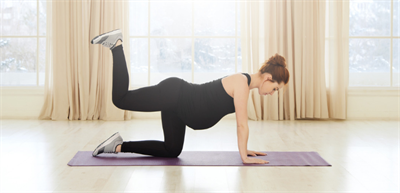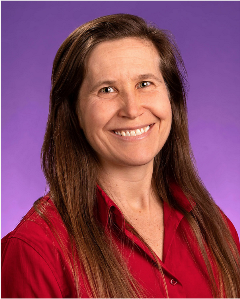Linda May, PhD, MS, FACSM |
Oct.
28, 2019
Pregnancy is such a wonderful, exciting and scary time of life. I am so glad it takes about nine months; it gave me time to prepare for our first little bundle of joy. As a new mom, I had no idea how someone so little and adorable could take so much of my time, attention and love. Besides all of the craziness of adjusting to motherhood and baby’s schedule, it was exciting to see human development firsthand. As a trained exercise physiologist, it was very interesting to see how my little one developed motor skills. As a new mother, I made note when baby first rolled over, crawled, sat up and walked.
 It was even more exciting when I took my baby to the pediatrician for a well checkup and reported baby’s milestones, such as rolled over at three months, sat upright about five and a half months, and walked unassisted at nine months. The pediatrician noted these are within the normal, but about two to three months early compared to the average baby. Also, seasoned grandparents who told me, “This is the strongest baby I have ever seen!” would fill me with delight and wonder.
It was even more exciting when I took my baby to the pediatrician for a well checkup and reported baby’s milestones, such as rolled over at three months, sat upright about five and a half months, and walked unassisted at nine months. The pediatrician noted these are within the normal, but about two to three months early compared to the average baby. Also, seasoned grandparents who told me, “This is the strongest baby I have ever seen!” would fill me with delight and wonder.
As exciting as this story is, I noted that my story was not unique. In speaking with many other moms, their stories were similar. As I continued to listen to the stories, we all noted that we were active exercisers during our pregnancies. Interesting.
As a researcher studying the effects of exercise during pregnancy on offspring heart outcomes, we have seen exposure to maternal exercise seems to benefit heart development. With these mothers’ stories in mind along with my own experiences now with two children and many anecdotal stories of friends and research participants, we wondered if exercise during pregnancy could somehow influence baby’s neuromuscular development, leading to these outcomes that so many women have reported to me.
With this in mind, I decided to enlist the help of an expert in the area of child movement, a pediatric physical therapist (PT). I explained my story and the story of many women to my PT colleague and the idea to test if exercise during pregnancy influences child motor development. She was skeptical but interested enough in child health and development to help me.
With funding from the American Heart Association and East Carolina University, we were able to begin a randomized trial to determine if supervised aerobic exercise during pregnancy had an effect on one-month old motor skills. Much to my PT colleague’s surprise, we found that yes, aerobic exercise during pregnancy is associated with improved motor skills of one-month old infants. This is exciting! Our research was published in the August 2019 issue of Medicine & Science in Sports & Exercise.
If kids are better movers this young, will they continue to be good movers as they develop? Could this help decrease the likelihood of children being obese? These are all exciting questions that we hope to answer in the near future. Undoubtedly, more work needs to be done in this field.
For the moment, women who are considering having children or already pregnant and wanting their children to be “movers” should take note that this influence begins during pregnancy. Staying active or becoming active may help your children to move better after birth. You may be chasing your little one more as they grow up, but that is better for everyone too, right? Happy moving!
Learn more about Dr. May’s research in this article from Gretchen Reynolds in the New York Times.
 Linda May, PhD, MS, FACSM, is an associate professor at the East Carolina University School of Dental Medicine, teaches dental students and is adjunct faculty assistant professor of exercise physiology for Health and Human Performance as well as obstetrics and gynecology for the Brody School of Medicine. Dr. May conducts research on topics relating to the influence of maternal exercise during pregnancy on child development before and after birth. Her research is presented in world-wide media outlets, including the New York Times.
Linda May, PhD, MS, FACSM, is an associate professor at the East Carolina University School of Dental Medicine, teaches dental students and is adjunct faculty assistant professor of exercise physiology for Health and Human Performance as well as obstetrics and gynecology for the Brody School of Medicine. Dr. May conducts research on topics relating to the influence of maternal exercise during pregnancy on child development before and after birth. Her research is presented in world-wide media outlets, including the New York Times.